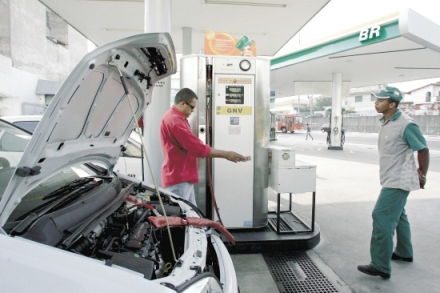
Brazil spends huge sums of oil on offshore oil production (The picture shows the company's gas station)
On September 3, Petrobras agreed to pay the Brazilian government a new $42.5 billion worth of new shares to acquire the right to extract 5 billion barrels of crude oil in offshore oil fields. However, this move is not conducive to the company's plan to issue new shares, and the funds raised may be less than expected.
The filing shows that after two weeks of negotiations, Petrobras agreed to pay the government an average of 8.51 US dollars per barrel of oil, in exchange for six offshore oilfield exploitation rights, including Franco and Tupi and other two deep-sea oil fields.
According to Taiwan’s “Economic Daily†news, Brazilian Finance Minister Mondi Jia said that this transaction is the largest exchange of oil shares, details and conditions will be announced on the 3rd.
However, the amount paid by Petrobras is much higher than the market expectation of US$5 to US$6 per barrel, which may cause dilution of the company’s shareholders’ equity. In the report last month, Swiss bank analyst Haberberg pointed out that if Petrobras pays more than US$7.5 per barrel, it may force the company to sell more stocks expected by investors to the government and dilute its earnings per share.
Pirates, an energy expert at the Brazilian Infrastructure Center, said: “Each barrel of 8.51 US dollars, there will be pressure on the stock price.†Brazilian analyst Ativa’s Monica Araujo also pointed out that the price is “extremely high†and far exceeds the market. expected.
This oil-for-share exchange may not be conducive to Petrobras’ plan to increase capital. The company plans to publicly issue new shares to raise another 25 billion U.S. dollars in cash, and it is necessary to persuade investors to subscribe for shares in the coming days. Petrobras expects to announce the details of the sale on the 3rd, but the company hopes to complete the exchange and sale of shares before the September deadline to avoid a collision with the October 3 presidential election.
The uncertainty caused by this transaction has caused Petrobras stock price to drop by more than 26% this year.
Soros, a billionaire investor, also had his hands on Brazilian oil stocks last season. However, Petrobras’ share price rose 4.4% in early trading to R28.15.
The deal also shows that the Brazilian government wants to strengthen control over Petrobras's operations. Officials have stated that they hope that the government’s equity can be increased from about 30% to as much as 40%. Brazil’s independent energy analyst Morro said: “The Brazilian government is increasing its shareholding by exerting pressure on shareholders. The political mission of Petrobras has gradually replaced commercial missions.â€